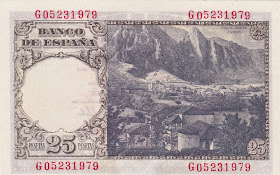Spain Banknotes 25 Pesetas banknote 1946 Alvaro Florez Estrada
Bank of Spain - Banco de España
Obverse: Portrait of the Spanish economist Álvaro Flórez Estrada (1766–1853), engraved by José Luis López Sánchez.
Reverse: View of Pola de Somiedo, Asturias, engraved by Alfonso López Sánchez. Pola de Somiedo is one of fifteen parishes (administrative divisions) in Somiedo, a municipality within the province and autonomous community of Asturias, in northern Spain.
Watermarking: Greek head.
Size: 122 x 89 mm. Circulation: 110 269 000 notes. In circulation from July 29, 1948.
Printed by FNMT (Fabrica Nacional de Moneda y Timbre - National Coinage and Stamp Factory).
Date of Issue: 19 February 1946.
Spain Banknotes - Spain Paper Money
1946 Issue
25 Pesetas 100 Pesetas 500 Pesetas 1000 Pesetas
Alvaro Florez Estrada
The Asturian economist Álvaro Flórez Estrada (1766–1853) has earned the title of “the most relevant theorist of liberalism” in nineteenth-century Spain by espousing liberal — even “extremely liberal” — ideas “that nobody questions” His views on land property are treated as if they were a mere exception with no impact on his classical-liberal framework. In this essay, I explore the limitations in Flórez’s liberal analyses, especially those contained in his most important work, Curso de economía política, first published in London in 1828. Flórez relied on Locke and the Spanish liberal tradition and made liberal statements on a number of topics, from trade, production, public debt, and paper money to press and religious freedom, but he did not support all private property, recommending emphyteusis in land and stating that land is not legitimate property (emphyteusis is a prolonged or even perpetual right to a landed estate that belongs to another). He justified land expropriations by concerns for the general welfare and the development of a backward country. Almenar calls Flórez a “revolutionary pioneer,” arguing that he was not a socialist but an antirentist.

